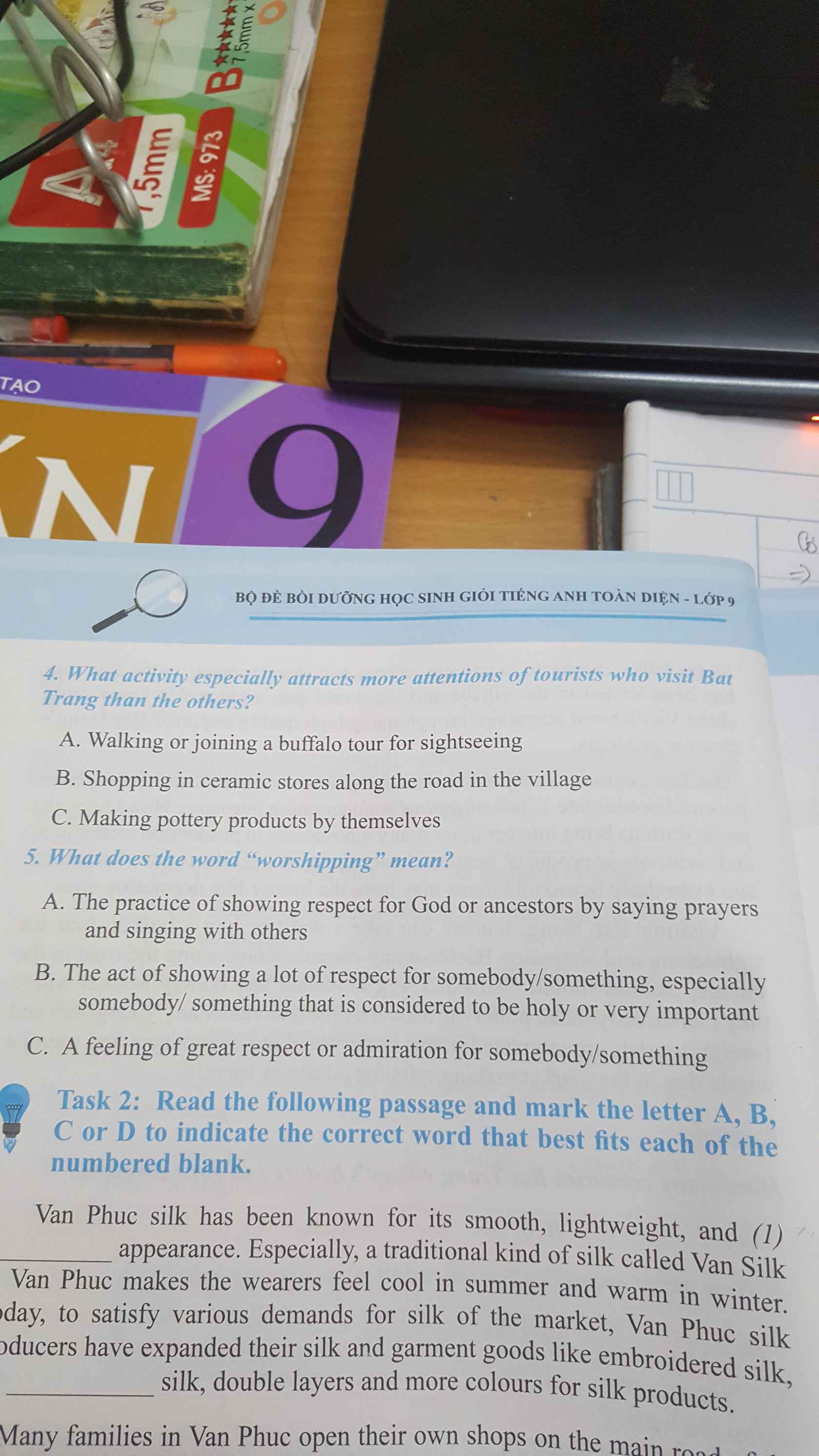Học tại trường
Chưa có thông tin
Đến từ
Chưa có thông tin , Chưa có thông tin
Số lượng câu hỏi
34
Số lượng câu trả lời
61
Điểm GP
18
Điểm SP
40
Người theo dõi (2)
Đang theo dõi (6)

Chủ đề:
Luyện tập tổng hợpCâu hỏi:
III. Rewrite the following sentences, beginning as shown without changing the meaning. (1.0pt)
1. I was very sleepy but I still wanted to watch the football match on TV.
Although __________________________________________________
2. “Do you know what the time is, Mary?” asked John.
John asked _________________________________________________
3. This is the first time Jane has ever visited Vietnam.
Jane has _____________________________________________________
4. My mother doesn’t like living in such a small house.
My mother wishes ___________________________________________
5. She left university two years ago.
It is _________________________________________________________
6. “Do you like classical music?” She asked me
She asked me _________________________________________________
7. The girl is very friendly. She lived next door to us.
The girl ______________________________________________________
8.We were late for school because of the heavy rain.
Because it ____________________________________________________
9. They have just sold that old house.
That old house _________________________________________________
10. In spite of the bad weather, they had a wonderful holiday.
Although ______________________________________________________

Chủ đề:
Luyện tập tổng hợpCâu hỏi:
Passage 1
It's important (1) ______ well, especially when you're students. If you are at (2) ______, you may go home for lunch, and have a cooked meal of (3) ______ or fish and vegetables. Or perhaps you take some food with you to school, and eat it in the lunch (4) ______. A chicken and lettuce sandwich, with some fresh (5) ______, would be a light but healthy lunch. Many people around the world eat plain, (6) ______ rice two or three times a day. Pupils and students often don't eat well when they're revising for an exam - they eat chocolate and drink lots of black coffee! And by the way, doctors say everybody should start the day with a healthy breakfast .It's also good for you to drink a lot of water right through the day.
1. A. eats | B. to eat | C. eating | D. have eaten |
2. A. school | B. primary | C. office | D. class |
3. A. cheese | B. meat | C. fruit | D. seafood |
4. A.timetable | B. classroom | C. lesson | D. break |
5. A. lemons | B. fruit | C. chicken | D. peas |
6. A. boiled | B. baked | C. grilled | D. roast |
Passage 2
The tourist industry is considered to be (1) ______ largest industry. Before 1950, one million people traveled abroad each year but by 1990s, the figure had risen to 400 million every year. Such large (2) ______ of tourists; however, are beginning to cause problems. For example, on the Alps the skiers are destroying the mountains they came to enjoy. Even parts of Mount Everest in the Himalayas are reported to be covered (3) ______ old tins, tents and foods that have been thrown away. But at a time (4) ______ we have greater freedom to travel than ever before, more and more people are asking how they can enjoy their holidays without (5) ______ problems by spoiling the countryside. Now there is a new holiday guide called “Holidays that don’t cost the earth”. It tells you how you can help the tourist industry by (6) ______ your travel agent the right before you go on holiday.
1. A. the | B. a | C. an | D. x |
2. A. number | B. many | C. numbers | D. a lot |
3. A. on | B. in | C. with | D. by |
4. A.that | B. which | C. where | D. when |
5. A. caused | B. causing | C. to cause | D. by causing |
6. A.asking B. asks C. ask D.asked
Passage 3
Our arrival in New York was spectacular. It’s skyscrapers and the Statue of Liberty make a beautiful sight. New York has a (1) ______ of over seven million and it is probably the world’s most famous city. The inhabitants of the “Big Apple” come (2) ______ many different countries. There are more nationalities in New York (3) ______ in any other places on the earth. It is also has more tourists than any other city except London, especially in the summer. (4) ______ come from all over the world and have a wonderful time. There are so many (5) ______ for them to get enthusiastic about – whether it’s some of the (6) ______ museums in the world or the charming little streets of Greenwich Village.
1. A. attraction B. impression C. population D. people
2. A. from B. by C. for D. in
3. A. than B. rather C. of D. to
4. A. Visit B. Visitors C. Workers D. Goers
5. A. attraction B. place C. area D. sights
6. A. best B. better Cgood D.well
Passage 4
Today, supermarkets are found in almost every large city in the world. But the first supermarket (1) ______ opened only fifty years ago. It was opened in New York by a man named Michael Cullen. A supermarket is different (2) ______ other types of stores in several ways. In supermarkets, goods are placed on open shelves. The(3) ______ choose what they want and take them to the checkout counter. This means that fewer shop assistants are needed than in other stores. The way products are displayed is another difference between supermarkets and many other types of stores; (4) ______ example, in supermarkets, there is usually a display of small inexpensive items just in front of the checkout counter: candies, chocolates, magazines, cheap foods and so on. Most customers (5) ______ go to a supermarket buy goods from a shopping list. They (6) ______ exactly what they need to buy. They do the shopping according to a plan.
1. A. is B. has been C. was D. were
2. A. in B. from C. of D. with
3. A. customers B. managers C. assistants D. sellers
4. A. in B. for C. of D. by
5. A. who B. what C. which D. whom
6. A. know B. knows C. knew D. known
Passage 5
Singapore is an island city of about three million people. It’s a beautiful city with lots of parks and open spaces. It’s also a very (1) ______ city.
Most of the people (2) ______ in high-rise flats in different parts of the island. The business district is very modern with (3) ______ of high new office buildings. Singapore also has some nice older sections. In Chinatown, there (4) ______ rows of old shop houses. The government buildings in Singapore are very beautiful and date from the colonial days.
Singapore is famous (5) ______ its shops and restaurants. There are (6) ______ good shopping centers. Most of the goods are duty free. Singapore’s restaurants sell Chinese, Indian, Malay and European food, and the prices are quite reasonable.
1. A. large B. dirty C. small D. clean
2. A. live B. lives C. are living D. lived
3. A. lot B. lots C. many D. much
4. A. is B. will be C. were D. are
5. A. in B. on C. at D. For
6. A. much B. many C. a D. the
Passage 6
Most of the people who like films are only interested in the leading actor or actress when they enjoy a film. It seems to them that only the actors or actresses have made the film successful. They always pay attention to their appearance, performance, and fashion. There are many film viewers who have no awareness of the other people’s work to make a film. A finished film is, actually, the result of the collaboration of many people, and the most important among them are the scriptwriter, the cinematographer, the film editor, the actor, and the director. Especially, in some thrilling scenes, the roles of stuntmen are very important. They are always in danger when they are acting; some of them are even badly hurt or dead. But what a pity, many film viewers rarely appreciate their work.
1. To many film viewers, _______.
A. the director is the most important
B. no one is more important than the leading actor or actress
C. the stuntmen play the most important role
D. the most important person is the cinematographer
2. Many film viewers always pay attention to _______.
A. the director’s name and appearance
B. the pictures taken by the cinematographer
C. the leading actors’ or actresses’ family
D. the actors’ and actresses’ appearance, performance, and fashion
3. The work of stuntmen is _______.
A. secure B. dangerous C. interesting D. thrilled
4. A finished film is the result of the collaboration of _______.
A. many people B. the actors C. the actresses D. the director
Passage 7
Litter on Mount Everest
Mount Everest is the highest mountain in the world. It is also the highest trash pile in the world. About 400 people try to reach the top every year. Having many climbers means a lot of trash.
It is very dangerous to climb Mt. Everest. The air is very thin and cold. Most people carry bottles of oxygen; they could die without it. When the oxygen bottles are empty, people throw them on the ground. When strong winds rip their tents, people leave them behind. They don’t have the energy to take the trash away. They only have enough energy to go down the mountain safely.
Trash is a terrible problem. Since people first began to climb Mt. Everest, they have left 50,000 kilos of trash on the mountain. Several groups have climbed the mountain just to pick up the trash. When people plan to climb the mountain, they have to plan to take away their trash.
1. What is the main topic of the passage?
A. Wind on the mountain B. A problem with trash
C. A dangerous mountain D. Climbing safely
2. Where do climbers put their empty oxygen bottles?
A. On the ground B. In trash cans C. On their back D. In their tents
3. Why do climbers leave their trash on the mountain?
A. Special groups will pick it up. B. The wind will blow it away.
C. They don’t have the energy to take it away. D. Other climbers will use it later.
4. How much trash has been left on the mountain?
A. Four hundred kilos B. Four thousand kilos
C. Five thousand kilos D. Fifty thousand kilos
5. Why do climbers on Mount Everest carry bottles of oxygen?
A. The weather is not cold. B. Climbing makes them tired.
C. The air is very thin. D. They are thirsty.
6. In line 6, the sentence: “people leave them behind”, what does the word them refer to?
A. Tents B. Oxygen bottles C. Strong winds D. Other climbers
Passage 8
Between the months of November and May, a wind blows from the west in most part of Indonesia. It comes from ocean and carries rain. Clouds build up around the mountains, and every afternoon rain falls. The rain is always heavy, and rivers now become dangerous. When it rains the whole day, they may suddenly overflow and cause great damage to the land.
Most farmers are glad when the wet season begins. There is water for their fields and they can again start growing rice. But people in town are not so glad for the streets soon get muddy and dirty. They prefer the dry seasons when they can sit outside and enjoy cool evening.
1. What comes from the ocean?
A. a river B. a wind C. a rain D. a cloud
2. What causes the rain?
A. Clouds building up around the mountains
B. The afternoon
C. The mountains
D. The ocean
3. What damages the land?
A. The wet season B. The overflow of the rivers
C. The dry season D. The sudden rain
4. Why can farmers start growing rice again?
A. Because the land has been damaged. B. Because the river overflow.
C. Because there is water for their fields. D. Because the dry season has begun.
5. Why are people in town not so happy in the wet season?
A. Because the streets are full of mud. B. Because the evenings are cool.
C. Because they are muddy and dirty. .D. Because they can sit outside.

Chủ đề:
Luyện tập tổng hợpCâu hỏi:
II. Choose the best option to complete each sentence. 2.5pts
1. We used to ______ past the market on the way to school.
A. walk B. walked C. walking D. have walked
2. Remember to turn ______ the light when leaving the office.
A. off B. on C. down D. in
3. “I’m afraid I can’t come to your birthday party this weekend!” -“______”
A. What a shame! B. What a pity! C. Me too. D. What a happened ?
4. Lan is very tired. ______, she has to finish her assignment before going to bed.
A. Although B. So C. Therefore D. However
5. I suggest ______ some money for poor children.
A. raise B. to raise C. raised D. raising
6. Have you ever ______ a letter to the local authorities to complain about the public transport in your town?
A. wrote B. writing C. written D. write
7. When are you ______ vacation with your family, Lan?
A. on B. by C. with D. to
8. If you ______ late, you wouldn’t finish your work.
A. come B. coming C. to come D. came
9. Huong wishes she ______ free time to visit her close friend in hospital.
A. to have B.had C. have D. having
10. I think I’ve lost my new hat. I’ve ______ it everywhere but I can’t find it.
A. looked out B. looked in C. looked on D. looked for
11. Maths and Literature are ______ subjects at school.
A. compulsory B. chosen C. optional D. free
12. The man ______ is sitting at that desk is my form teacher.
A. whom B. who C. which D. where
13. “______”- “Certainly.”
A. Welcome back! B. What are you doing there?
C. I’m sorry I’m late D. May I borrow a pencil, please?
14. If we ______ much pesticide on vegetables, the vegetables will become poisonous and inedible.
A. use B. used C. are using D. have used
15. He wishes he ______ a doctor now.
A. is B. was C. were D. would be
16. He is tired now ______ he stayed up late watching TV.
A. so B. because C. but D. and
17. We have learnt English ______ 2001.
A. in B. during C. for D. since
18. “Pass me that pen, please!” ~ “_______”.
A. Yes, please B. No, it isn’t C. Here you are D. It doesn’t matter
19. Let’s go swimming, ______?
A. won’t we B. don’t we C. do we D. shall we
20. He ______ with friends in an apartment in HCM city for two weeks.
A. living B. lived C. has lived D. live
21. I can’t understand the French visitors. I wish I ______ French.
A. knew B. will know C. know D. have known
22. The church ______ about 100 years ago.
A. is built B. was built C. will be built D. has been built
23. People in Israel are going to celebrate their festival ______ is called Passover.
A. whose B.who C. which D. where
24. ______ I was really tired , I couldn’t sleep.
A. Even though B. So C. Therefore D. Because of
25. Lan is very tired. ______, she has to finish her assignment before going to bed.
A. Although B. So C. Therefore D. However
26. “Sorry I’m late.” -“ ______”
A. OK B. Don’t worry C. Hold the line, please D. Go ahead
27. She asked me if I ______ a laptop computer the following day.
A.buy B. will buy C. bought D. would buy
28. I ______ telephone her if I knew her number.
A. would B. have to C. will D. shall
29. Honda motorbikes ______ in Viet Nam.
A. produce B. will produce C. are produced D. would be produced
30. We have learnt English ______ 10 years.
A. for B. since C. in D. during
31. They used ______ in the countryside.
A. to living B. living C. to live D. live
32. What should we do to reduce the level of environmental ______?
A. pollution B. pollute C. polluted D. polluting
33. I ______ John since he moved to our neighborhood.
A. knew B. has known C. have known D. know
34. They haven’t finished the project, ______?
A. haven’t they B. have they C. do they D. don’t they
35. “Thanks for your help.”- “______”
A. My pleasure. B. Don’t worry C. Thank you, too. D. The same to you.
36. He asked me ______?
A. where did I live B. where I lived C. where do I live D. where I live
37. “ I’ve passed my final exam.” - “______”
A. Good luck! B. It’s nice of you to say so.
C. That’s a good idea. D. Congratulations!
38. I’ve looked ______ my book everywhere but I can’t find it.
A. for B. after C. at D. in
39. This department store ______ three years ago.
A. built B. was built C. builds D. is built
40. Joe has three sisters. He wishes he ______ a brother.
A. have B. will have C. has D. had
41. I suggest ______ some money for poor children.
A. raise B. raising C. to raise D. raiseing
42. She didn't work hard enough, ______ she lost her job.
A. so B. but C. and D. although.
43. What ______ if there were a serious nuclear accident ?
A. happens B. will happen C. happened D. would happen
44. Please phone this number for more ______.
A. inform B. informative C. information D. informatively
45. Tom plays soccer very well, ______?
A. does he B. doesn't he C. did he D. didn't he.
46. “Let’s meet for a coffee to night.” -“ ______”
A. I hope not B. I’m afraid I can C. Yes, let’s D. Yes, thank you
47. The car ______ he has just bought is very expensive.
A. which B. who C. whom D. whose
48. Family members ______ live apart try to be together at Tet.
A.which B. who C. whom D.whose
49.We are ______ when the New Year's Eve is coming very near.
A.excitement B. excitedly C. excited D.exciting
50. ______ I was really tired, I couldn’t sleep.
A. Although B. So C. Therefore D. However

Chủ đề:
Luyện tập tổng hợpCâu hỏi:
REVISION 1
II. Choose the word that has the underlined part pronounced differently from the rest. (1.0pt)
1. A. student B. study C. studio D. stupid
2. A. dictation B. question C. foundation D. action
3. A. sad B. man C. fan D. car
4. A. ended B. wanted C. completed D. finished
5. A. think B. therefore C. throughout D. thanks
6. A. cleaned B. played C. used D. hoped
7. A. sky B. fly C. energy D. my
8. A. teacher B. machine C. change D. choice
9. A. garbage B. standard C. solar D. lunar
10. A. covered B. installed C. describled D. decorated
11. A. chopstick B. charity C. children D. Christmas
12. A. celebration B. plumber C. bulb D. blanket
13. A. books B. clubs C. hats D. stamps
14. A. beach B. clean C. instead D. leave
15. A. energy B. bicycle C. physics D. dynamite
16. A. saved B. suggested C. polluted D. provided
17. A. Easter B. meaning C. creature D. earthquake
18. A. spays B. disappoints C. wonders D. persuades
19. A. passed B. looked C. destroyed D. stopped
20. A. chair B. headache C. chemical D. school

Chủ đề:
Luyện tập tổng hợpCâu hỏi:
C. WRITING:
I. Finish each of the following sentences in such a way that it means the same as the sentence printed before. (1.0 point)
1. It is a pity that I can’t come to your birthday party tonight
I wish _______________________________________________________________
2. “ I live with my family in this city,” the girl said.
The girl said __________________________________________________________
3. Nobody has watered the trees since last Friday.
The trees _____________________________________________________________
4. Jack spent two hours painting the windows yesterday.
It took _______________________________________________________________
5. Jane doesn’t know Tim’s phone number, so she can’t call him.
If Jane ______________________________________________________________
6. My parents will sell the house in the country.
The house in the country _______________________________________________
7. I'm sorry David cannot be in Hue for the festival.
I wish ______________________________________________________________
8. If the man doesn't arrive, we will start the conference without him.
Unless _____________________________________________________________
9. My boyfriend is now in the hospital. He was injured in the accident.
My boyfriend, who ____________________________________________________
10. "I'm working in a restaurant", she said
She said that _________________________________________________________
11. My sister will continue studying English when he graduates in law.
My sister will go ______________________________________________________
12. Nga said: "I am going to visit my grandmother next weekend."
Nga said that ________________________________________________________
13. The doctor is working at Bach Mai hospital. You met him yesterday.
The doctor whom ______________________________________________________
14. Someone has stolen the picture
The picture ___________________________________________________________
15. In spite of her sickness, Mary insisted on going to work.
Although _____________________________________________________________
II. Complete each of the following sentences, using the words given (1point)
1. My /brother/ enjoy / play/ football.
_____________________________________________________________________
2. I/ know/ him/ since/ we/ be/ primary students/.
_____________________________________________________________________
3. If today/ Sunday, I/ go / fish/ brother/.
_____________________________________________________________________
4. It/ take/ me/ three hours/ get/ house/ tidy/ yesterday/.
_____________________________________________________________________
5. You/ should/ apologize/ her/ not/ attend/ wedding/.
_____________________________________________________________________

Chủ đề:
Luyện tập tổng hợpCâu hỏi:
Pasage 4. Read the passage and answer the questions
English is my mother tongue. Besides, I can speak French and Spanish. I studied the two languages when I was at high school. Now, I am still learning Spanish at the University. As for me, mastering a foreign language is not easy. After studying a language, practice is very necessary and useful. Travelling to the country where the target language is spoken is very helpful, but if you cannot speak the language well enough you will certainly have troubles. I also frequently go to the movies, watch television, listen to the radio in the language I am trying to learn. Reading is another good way to learn. Books are good, but I personally think newspapers and magazines are better. However, getting some knowledge of the language is the most important thing. Grammar and vocabulary should be mastered first.
1. How many languages can the writer speak?
A. 1 B. 2 C. 3 D. 4
2. The writer has learnt Spanish _______.
A. in Spain B. at high school C. at university D. B and C
3. Travelling may cause troubles if _______.
A. you cannot speak the language well enough.
B. you can speak the language well enough.
C. you can speak the language badly enough.
D. you can communicate in the target language.
4. Some useful ways to practice your target language are _______.
A. listening to the radio and watching TV in the language.
B. reading books in the language.
C. seeing films in the language.
D. all are correct.
5.The most important thing is____________________.
A. Mastering grammar and vocabulary
B. Practicing speaking
C. getting some knowledge of the language
D.Reading books and newspapers
Pasage 5. Read the passage and choose the best word to fill in each blank (2points)
amount burning because pollutes who of rubbish and green should |
One of the reasons, which (1)_________________ our environment , is that each household produces a large amount of (2)______________ every day. In order to reduce the pollution, we need to increase the (3)______________ of rubbish that is recycled (4)_____________we cannot carry on burying and (5)____________ rubbish forever. This means that we (6)_____________ reduce the amount of rubbish we produce and increase the amount we reuse and recycle. We also need to have a strict punishment for those (7)____________ throw rubbish on the streets, in the ponds, rivers (8)_______ seas. Besides, we ourselves should be aware (9)_____________ keeping our environment (10)____________, clean and beautiful.




Chủ đề:
Luyện tập tổng hợpCâu hỏi:
to 50.
On January 17, 1995, a powerful earthquake hit the city of Kobe, Japan. Many buildings burned or collapsed. Part of an expressway fell over. Train lines were damaged, so trains could not run, and supplies of electricity, gas and water were cut off. Soon after the earthquake was over, people in Kobe began working together to save their city. Neighbors pulled each other out of collaped buildings. Ordinary people put out fires even before the fire trucks arrived. Volunteers in Kobe organized themselves into teams. They worked out a system to send help to where it was needed. Some people brought food, water, clothes, and electric generators different parts of the city. Other teams searched for belongings in damaged stores and homes. Some volunteers took care of the children who had lost their parents. Teams of volunteers from outside Japan helped, too. A rescure team with search dogs came from Switzerland. A group of doctors called Doctors Without Borders came from all over the world. A group called the International Rescure Corps also sent its members to help.
Today, Kobe has been rebuilt. But people there still remember the outpouring of support they received from all over the world back in 1995.
Question 46: In 1995, Japan was hit by___________.
A. A volcano B. a hurricane C. an earthquake D. a flood
Question 47: Why did volunteers from other countries come to Japan after the earthquake?
A. All of the people in Japan were ill. B. They wanted to write about the earthquake.
C. They wanted to help the people in Japan . D. They wanted to visit Japan .
Question 48: The doctors in Doctors Without Borders___________________.
A. all came from Japan B. all came from Switzerland
C. used search dogs to help them D. came from all over the world.
Question 49: On the whole , the passage is about ______________.
A. an earthquake in Kobe , Japan. B. the roads and trains in Kobe , Japan.
C. how to organize volunteers. D. volunteers in Japan.
Question 50: The word “ it” in line 7 refers to ________.
A. team B. truck C. volunteer D. help














